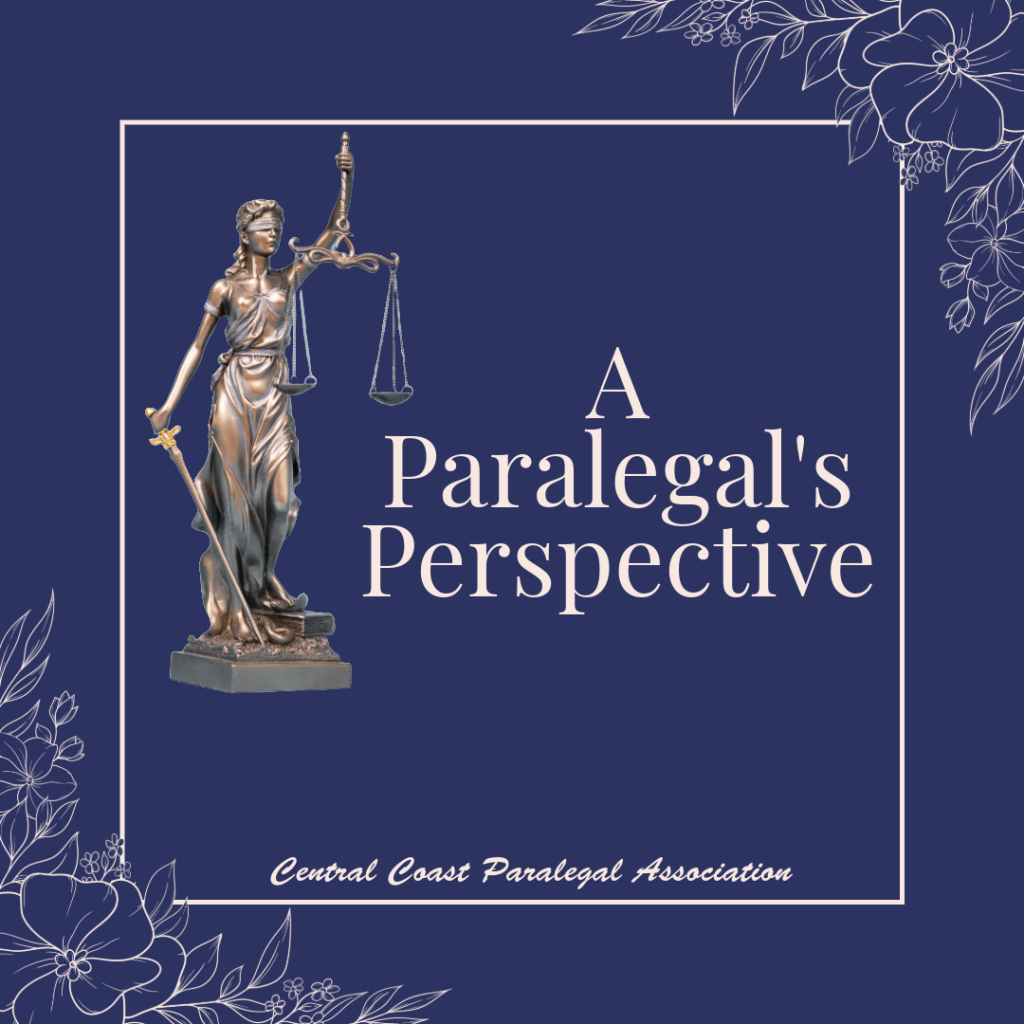
Welcome back to a Paralegal’s Perspective! This month’s interviewee is Tracy Morgan.
⚖️Why do you think paralegals should join the CCPA?
A: I would encourage everyone to join a professional organization, regardless of their occupation. Belonging to a professional organization will provide networking opportunities, assist with professional development, and allow socializing with your peers. Specific to the paralegal profession, being a CCPA member will provide mentoring, assist paralegals with staying current on changing laws and trends, and provide advocacy at the state level. CCPA also offers two scholarships a year, one of which is only available to CCPA members. Lastly, being a CCPA member will ensure you get the most up to date information right to our inbox.
⚖️Where do you see the paralegal profession advancing the most?
A: Some states are exploring the possibility of allowing limited licensing for paralegals which will allow paralegals to work independently without attorney supervision. Four states have already implemented these programs – Arizona, Minnesota, Oregon, and Utah. Ther are other states, California being one of them, that are exploring implementing similar programs. Unfortunately, in California there has been significant resistance from lawyers, the California Supreme Court and the California Legislature. There is still much work to be done before such a program can be approved in California but, I’m hoping this will be an option in the future.
⚖️What type of law do you work in and how did you end up in your current position?
A: I have always been a litigation paralegal. I fell into it by accident (that’s a story for another article). I have worked in many different areas of litigation including insurance defense, mass tort, employment law, and patent litigation. I have also worked on unfair import investigations before the U.S. International Trade Commission. I think those were my favorite cases. It was very stressful, but exciting. I was very fortunate to land my current position in 2021 when my husband and I moved to SanLuis Obispo. My husband had been offered a job and his new boss was kind enough to help me network and assisted me with making connections in the local legal community. This highlights the importance of networking and maintaining professional relationships.
⚖️Can you describe the top 3 skills you think paralegals should be well versed in? Why did you pick these skills specifically?
A: There are many skills every paralegal should have, it’s difficult to narrow the list to just three. If I have to pick only three, they would be attention to detail, researching and fact gathering, and effective communication.
Attention to Detail – Attention to detail is critical for every paralegal regardless of what area of law you practice. As a paralegal one of our responsibilities is to be a second set of eyes for our attorneys. For example, we may be asked to proofread a motion. As a paralegal, proofreading isn’t just checking for typos, spelling mistakes or grammatical errors. It is reviewing the overall composition of the document ensuring the writing style flows, all exhibits are referenced correctly, checking the title page and footers to make sure the format is compliant with local rules and the California Rules of Court. It may also entail reviewing all heading styles to make sure they are correct and confirming the proof of service lists all the correct parties and their attorneys. If you lack attention to detail this task might seem overwhelming.
Researching and Fact Gathering – Being a good researcher is a skill every paralegal must have. I think most if not all paralegal programs have a course on legal research. For a paralegal researching is more than just jumping on Westlaw or Lexis to locate cases and statutes. As a litigation paralegal you will likely be asked to do that, but there are many other types of research. A paralegal may be asked to research the title history of a property or ownership rights of a well. A paralegal may be asked to research a particular corporation and who owns it, whether the corporation has ever been involved in litigation or whether there are any liens against the corporation. Some of these answers may be found on Westlaw or Lexis, but a good paralegal will know where else to look. In addition to researching the answers to these questions, a good paralegal will also begin gathering facts and may even begin building a timeline of relevant events.
Effective Communication – I think we can all agree that good communication skills are essential in any profession, but I don’t think enough attention is given to being an effective communicator. Especially with regards to writing emails. I think we’ve all received lengthy, rambling emails where it was unclear what, if anything, the sender was asking us to do or what was being communicated. The reality is most people are busy and won’t get past the first few sentences. They will likely skim the email for the information they need to complete their task so they can check the box and move on. Being able to communicate with your audience clearly and concisely is an essential skill for every paralegal.
Thank you so much for your answers, Tracy!!
